

Brain Teasers Worksheets

Carrot Conundrum

Mind Puzzles

Dot Connect

Square Hunt

Phrase Puzzles
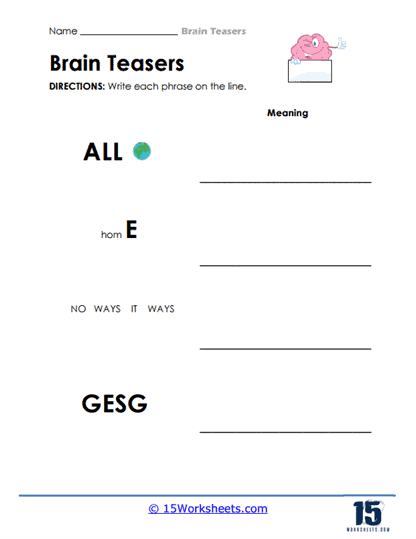
Puzzle Phrases
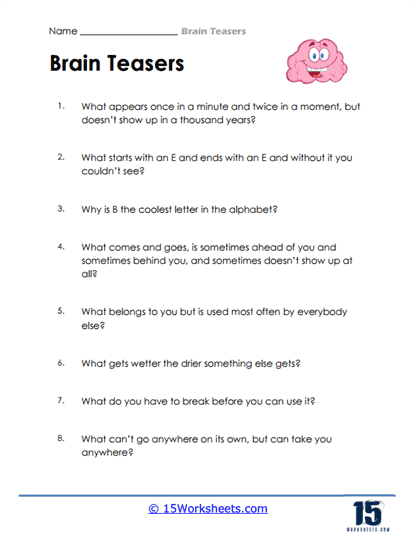
Riddle Quest
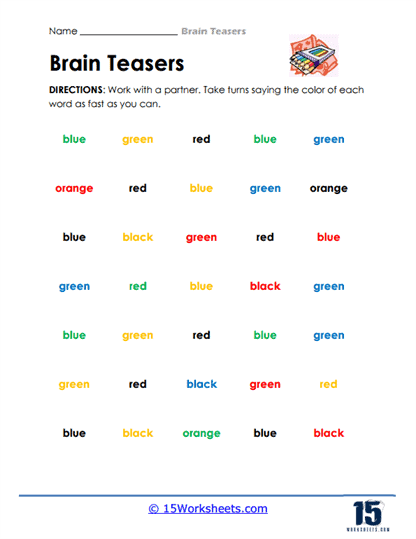
Garden Puzzle
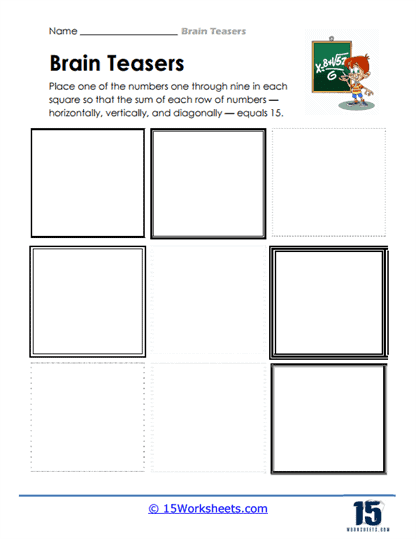
Puzzle Play
About these 15 worksheets.
This collection of worksheets is a versatile and engaging resource designed to challenge students’ critical thinking, logic, and problem-solving skills through a variety of puzzles and riddles. This collection features a range of activities that are both fun and educational, making them ideal for classroom use, homeschooling, or independent practice. Each worksheet is thoughtfully designed to capture students’ attention while encouraging them to think creatively and analytically. With worksheets available in easy-to-view, download, and print PDF formats, this collection offers convenience and flexibility for teachers, parents, and students alike.
One of the key features of this collection is the variety of brain teasers that cater to different learning styles and skill levels. For instance, the “Remove Carrots” puzzles challenge students to strategically remove certain elements to create specific shapes, honing their spatial reasoning and problem-solving skills. These visual puzzles require students to think ahead and plan their moves carefully, making them excellent exercises for developing logical thinking. Another example is the classic dot-connecting puzzle, where students must draw four straight lines to connect all dots without lifting their pencil. This task encourages out-of-the-box thinking and introduces students to the concept of efficiency in problem-solving.
The collection also includes traditional riddle-based worksheets that prompt students to solve verbal and mathematical puzzles. For example, students might encounter questions such as “What appears twice in morning, twice in evening, but only once at night?” or “What number can you multiply with any other number and always get the same answer?” These riddles are designed to engage students’ curiosity and encourage lateral thinking. By working through these puzzles, students practice critical reading and comprehension skills, as well as mathematical reasoning, all while having fun with wordplay and number games.
Another highlight of the collection is the inclusion of rebus puzzles, where students must decipher phrases or idioms based on visual clues. These worksheets are particularly effective at developing language skills, as students must use context and their understanding of language conventions to solve the puzzles. For instance, a puzzle might feature the word “blood” above “water,” prompting students to infer the phrase “blood is thicker than water.” Such activities not only strengthen students’ language abilities but also their capacity for abstract thinking.
In addition to these specific examples, this series features a wide range of other activities designed to stimulate students’ cognitive abilities. Worksheets might include mazes, where students must navigate through complex paths, or matching games that test memory and pattern recognition. Each activity is designed to be challenging yet accessible, ensuring that students of all levels can benefit from the exercises. The collection also includes tasks that require students to identify patterns, solve sequencing puzzles, and complete analogies, all of which are essential skills for academic success.
Teachers and homeschoolers will appreciate the ease of incorporating these worksheets into their lesson plans or daily routines. The activities are designed to be flexible, allowing educators to use them as warm-up exercises, supplemental practice, or even as part of a more comprehensive lesson on critical thinking and problem-solving. The diversity of the worksheets ensures that students remain engaged and motivated, as they are constantly exposed to new and varied challenges.
Parents can also use these worksheets at home to support their children’s learning in a fun and relaxed environment. The Brain Teasers Worksheet collection provides an excellent opportunity for families to work together on puzzles, fostering a collaborative and supportive learning atmosphere. By tackling these brain teasers, students not only build essential cognitive skills but also gain confidence in their ability to think critically and solve problems independently.
The collection’s emphasis on both creativity and logic ensures that students are developing a well-rounded set of skills. By regularly engaging with these puzzles, students will improve their ability to approach problems from different angles, think critically about the information presented to them, and develop strategies for arriving at solutions. These are skills that are not only valuable in the classroom but also in everyday life, as they equip students to handle challenges with confidence and resilience.
What Are Brain Teasers?
Brain teasers are puzzles or problems that require creative thinking, logic, and problem-solving skills to solve. Unlike straightforward questions that may have a clear and immediate answer, brain teasers often involve lateral thinking, where the solution is not always obvious and may require looking at the problem from a different perspective. These puzzles can take many forms, including riddles, visual puzzles, word games, and mathematical challenges. They are designed to stimulate the brain, encouraging individuals to think critically and analytically.
The primary purpose of brain teasers is to challenge the mind and improve cognitive abilities. By engaging with these puzzles, individuals are prompted to use their reasoning skills, enhance their memory, and develop their concentration. Brain teasers often require solvers to break away from conventional thinking patterns, which helps in developing flexibility in thought processes. This ability to approach problems from various angles is a valuable skill, not just in academics, but also in everyday decision-making and problem-solving situations.
Brain teasers are beneficial in enhancing both verbal and non-verbal skills. For instance, riddles and word puzzles improve language skills, vocabulary, and comprehension, while visual puzzles and spatial reasoning challenges enhance the ability to interpret and manipulate shapes and patterns. Mathematical brain teasers, on the other hand, reinforce arithmetic skills and logical reasoning. The diversity in the types of brain teasers available ensures that different areas of cognitive function are exercised, making them a well-rounded tool for mental development.
In addition to cognitive benefits, brain teasers also serve as a source of entertainment and motivation. The process of solving a challenging puzzle and arriving at the correct solution can be highly satisfying, providing a sense of accomplishment. This rewarding experience can boost an individual’s confidence and encourage a positive attitude toward learning and problem-solving. For students, brain teasers can make learning more engaging and enjoyable, fostering a love for challenges and intellectual curiosity.
- My Storyboards
Logic Problem Worksheets
Customize logic problem worksheets.
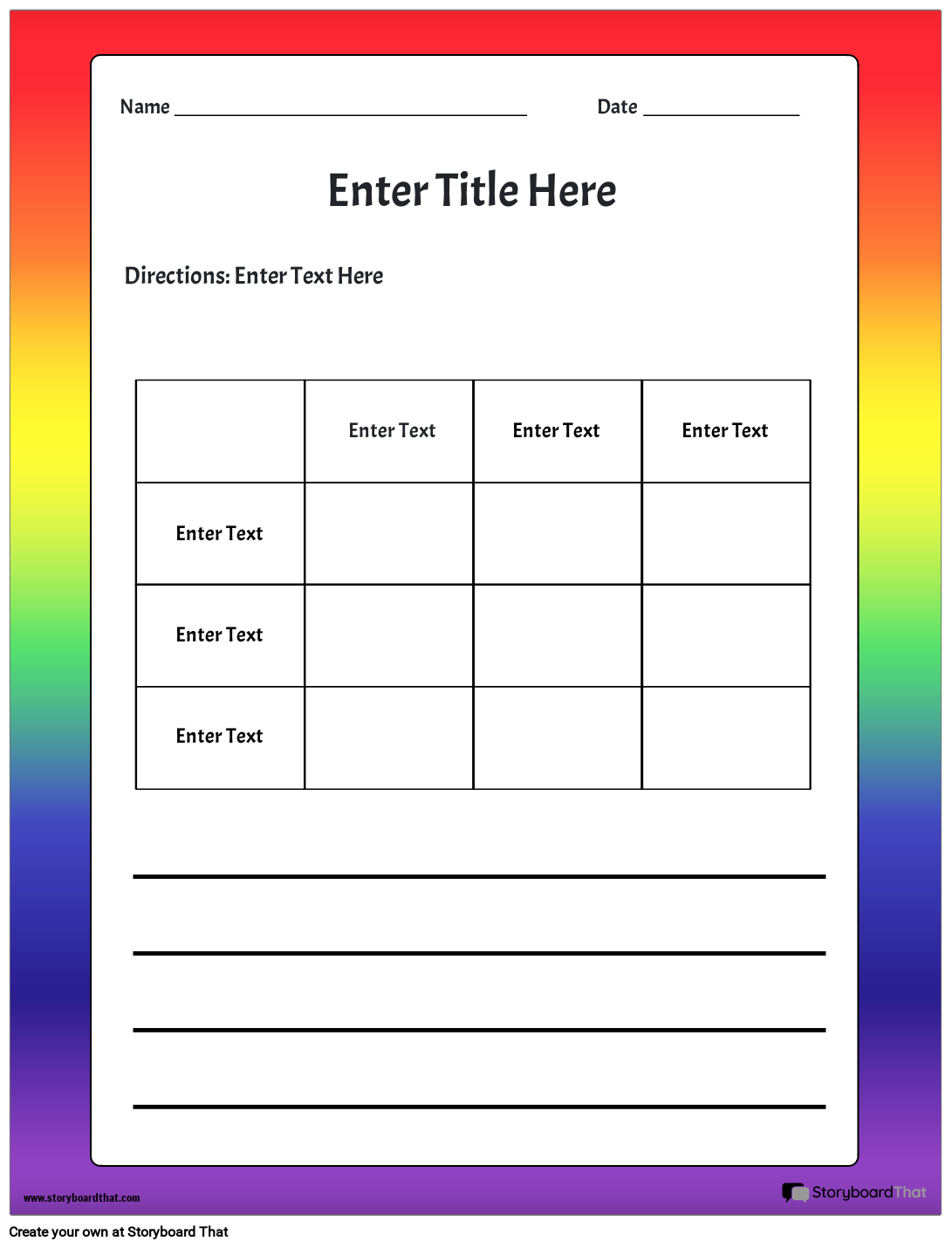
If you're assigning this to your students, copy the worksheet to your account and save. When creating an assignment, just select it as a template!
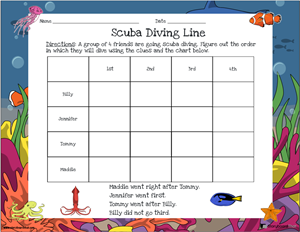
Exploring Logic Problem Worksheets
Incorporating logic puzzle worksheets into your teaching or parenting repertoire is a great way to engage students, exercise their minds, and foster critical thinking skills. Whether you're focusing on math challenges, geometry, or general logical thinking, these puzzles offer a free and enjoyable way for students to practice and improve their problem-solving abilities. So, print some riddles worksheets today, and watch your students' logical thinking skills flourish.
Logic Problem Worksheet Ideas
- Geometry Challenge Quest (Geometry Logic Worksheets): High school students solve geometry puzzles using worksheets. They apply geometric knowledge to crack codes and find hidden treasures.
- Logic Olympics (Logic Puzzle Worksheets for High School): High school students compete in solving challenging puzzles, earning points for correct solutions in a friendly Olympics competition.
- Logical Detective Challenge (Proof Worksheet): Students act as detectives, using proof worksheets to solve a fictional crime by constructing logical proofs based on evidence.
- Building Logical Bridges (Logic Model Worksheet): Students use model worksheets to create flowcharts and decision trees, helping them visualize and understand complex processes.
- Escape Room: The Logic Lab (Logic Puzzles for 5th Graders): 5th graders work together to escape a virtual lab by solving puzzles, deciphering clues, and unlocking locks.
- Picnic Adventure (3rd Grade Logic Problems): 3rd graders embark on a virtual picnic adventure filled with problems to foster critical thinking and logic skills while having fun.

Steps to Make a Logic Problem Worksheet
- Choose a Theme or Scenario: Choose a theme or subject for your worksheet to engage students with context.
- Determine the Rules and Constraints: Set rules and constraints for your puzzle, specifying the number of elements and conditions for solving it according to how difficult or child friendly you want it to be.
- Craft Clues and Hints: Create clear, concise clues logically linked to the puzzle's theme and rules to guide students to the solution.
- Create a Grid or Structure: Design a grid or structure to aid students in organizing information and deductions, tailored to the type of puzzle being created. Grids are commonly employed for tracking potential solutions.
- Test and Refine: Test the worksheet for a unique, solvable solution and adjust difficulty as required to maintain engagement.
- Format and Present: Format the worksheet for clarity and visual appeal, making it easy to read and understand. Ensure it fits standard paper if printed and includes clear instructions, or use user-friendly online formats like PDFs when sharing it digitally.
Storyboard That Resources and Free Printables
Whether you prefer to engage in problem-solving activities on paper or through digital interfaces, there's a versatile learning tool for you, from traditional pen-and-paper exercises to interactive worksheet logic puzzles. Printable worksheets are an alternative to hands-on interactive experiences, and they differ from solving a logic problem online in that they make students engage in dynamic, real-time challenges that encourage active critical thinking. Storyboard That is the ideal online platform for crafting a wide range of educational materials, including printable logic puzzles worksheets. Whether you need logic problems for high school students or logic problems 3rd-graders can solve Storyboard That's user-friendly interface and pre-made templates streamline the process. You can also adapt these materials for online use, ensuring accessibility and flexibility. Storyboard That also provides the convenience of creating logic problems worksheets that are not only engaging but also easily printable, making it a versatile tool for educators seeking to enhance critical thinking skills in students of all ages.
- Cause and Effect Worksheets
- Sequencing Worksheets
- Problem Solving Worksheets
- Making Predictions Worksheets
How to Make a Logic Problems Worksheet
Choose one of the premade templates.
We have lots of templates to choose from. Take a look at our example for inspiration!
Click on "Copy Template"
Once you do this, you will be directed to the storyboard creator.
Give Your Worksheet a Name!
Be sure to call it something related to the topic so that you can easily find it in the future.
Edit Your Worksheet
This is where you will include directions, specific images, and make any aesthetic changes that you would like. The options are endless!
Click "Save and Exit"
When you are finished, click this button in the lower right hand corner to exit your storyboard.
From here you can print, download as a PDF, attach it to an assignment and use it digitally, and more!
Happy Creating!
Frequently Asked Questions about Logic Problems Worksheets
How do logic problem worksheets benefit students.
Logic problem worksheets help students develop critical thinking, reasoning, and problem-solving skills. They also improve attention to detail, logical deduction, and the ability to work with complex information.
Are there different types of logic problems, and if so, what are some examples?
Yes, there are various types of logic problems, including grid logic puzzles (e.g., Sudoku), cryptic crosswords, logic grid puzzles, and math logic problems. Each type presents unique challenges for students.
Do logic problem worksheets only focus on math-related content?
No, logic problem worksheets can cover a wide range of topics and are not limited to math. They can incorporate language, science, history, and more, depending on the chosen theme or scenario.
Pricing for Schools & Districts
Limited Time
- 5 Teachers for One Year
- 1 Hour of Virtual PD
30 Day Money Back Guarantee • New Customers Only • Full Price After Introductory Offer • Access is for 1 Calendar Year

- Thousands of images
- Custom layouts, scenes, characters
- And so much more!!
Create a Storyboard
Introductory School Offer
30 Day Money Back Guarantee. New Customers Only. Full Price After Introductory Offer. Access is for 1 Calendar Year
Generating a Quote
This is usually pretty quick :)
Quote Sent!
Email Sent to

IMAGES